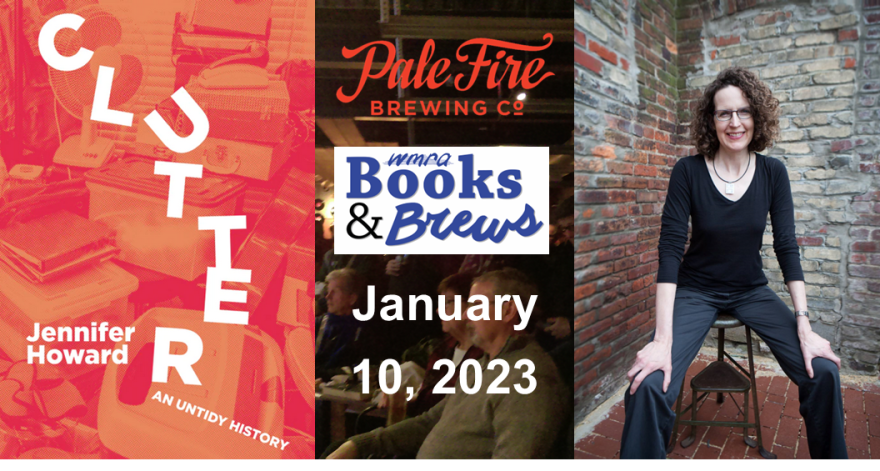We all have a lot of stuff. But for some people, they have so much stuff that it begins to take over their lives. For author Jennifer Howard, she faced clutter head on when she cleaned out her mother’s home – a traumatizing experience that she shares in her book Clutter – An Untidy History. Howard is our speaker for Books & Brews on Tuesday, January 10, at Pale Fire Brewing in Harrisonburg at 7pm. WMRA’s Chris Boros spoke with Jennifer and asked her to talk about what happened when she was going through her mother’s stuff.
Jennifer Howard: Over a period of years, she had accumulated a staggering amount of stuff, but I was shocked by what I found when I started having to go through all of her things to try to figure out what to do with them. All that stuff has to go somewhere but I couldn't just throw it in a dumpster and get rid of it. I had to figure out what it was, whether it was meaningful and valuable to someone useful and it was really a kind of a crushing process, but when I started talking to friends, I realized I was not alone, that a lot of people in my generation had gone through this, or were about to have to go through it, and it got me curious about why this is such a huge problem for so many of us, what were the origins of the problem? And the book was also a kind of a catharsis for me to write.
WMRA: How was the clutter in your personal life when you started writing this book and has it changed now that you've written this book?
JH: I think I’m working toward a mindful balance where I appreciate my things but don't let them get the better of me
WMRA: And for some people, it does get the better of them. You examine hoarding in your book. I've been watching that show Hoarders for a while. I have mixed emotions when I watch the show. I feel bad for the people, but I'm also angry with them too. What did you learn researching hoarding disorders?
JH: It's fascinating. There's so much to explore there. I think the medical health profession has come a long way in terms of recognizing hoarding disorders as a separate set of issues. I went to a conference on hoarding in Philadelphia several years ago. One of the social workers there said that basically if you come in and do a force clean out of somebody's house, you're not going to fix them. You’re just going to traumatize them further and make it harder for them to deal with their struggles.
WMRA: There is something oddly special though about acquiring stuff. I have this huge collection of CDs and I want more. I don't listen to them all but they’re for the collection. They're in alphabetical order, they're in chronological order. So why does it feel so good to keep getting more stuff?
JH: Well, it doesn't sound like you have a hoarding problem. It's an expression of a passion of an interest it helps define you. Those CDs are serving you in your sense of self. That’s really a lovely way to collect things.
WMRA: I feel better now. Thank you.
JH: You have my permission. I'm not a minimalist.
WMRA: But what about those minimalists? Cleaning for 3-4 hours is just as unhealthy.
JH: A lot of it comes down to: are you in control of your stuff or is it in control of you? If you spend all of your time making sure to live a perfect minimalist life, you're still enthralled to your stuff, even if you don't have very much stuff.
WMRA: After your research, what do you think is the best advice you can give somebody about fixing up the clutter in their lives?
JH: It’s such a good question.
WMRA: Clean your room right now!
JH: That doesn’t work. I’ve tried that with my kids. Giving somebody an opportunity to think about their things and what they want from their things. It’s a very different situation is you’re faced with a relative or friend who maybe does have a hoarding problem, that may require a different set of interventions. My advice in that situation would be to talk to people who are specialists in this if you can. To have an elder care agency or some agency that would put you in touch with people who can assess the situation and help you figure out what might be helpful.


